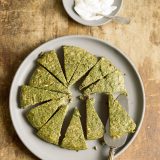Could eggs really be an afterthought in an omelet? In Iran, deliciously so. As France claims the omelet, Italy the frittata and Spain the tortilla, Iran has kuku, a baked egg dish that gets its flavor from copious fillings.
In the case of kuku sabzi, the flavor—and deep green color—come from fresh herbs measured not by the spoon, but by the cup. Many cups.
At Milk Street, we love this heavy-handed approach to fresh herbs. Using heaps of them delivers big flavor effortlessly, and keeps heavy dishes feeling light and fresh.
Kuku sabzi is traditionally served at Persian New Year’s feasts; it is jammed with herbs to symbolize rebirth. We pushed that to the limit, adding a mound of parsley, dill and cilantro (5 cups’ worth, to be precise) to give the eggs a robust freshness. It is a weekday-friendly approach to a boldly herb-laced dinner.
Despite six eggs, olive oil and a handful of walnuts (for texture and richness), the dish remains light. Much of that is due to the herbs. But it is also thanks to the baking powder, which forms tiny air bubbles that catch the steam released as the eggs cook, causing the batter to rise.
And while some recipes for kuku sabzi opt for stovetop cooking—calling for generous amounts of oil as well as inverting the omelet—we preferred the ease and comparative lightness of baking.




